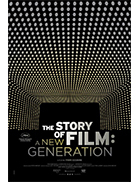The Story of Film: A New Generation
|  There has been much discussion about the impending death of cinema, especially since the COVID-19 pandemic shut down movie theaters for so long and reshaped the landscape of production and distribution. Of course, this hand-wringing has been going on since the birth of the medium, since Thomas Edison, one of the principal developers of motion picture technology in the late 19th century, didn’t think movies would sustain interest for more than a decade or so. How wrong he was. But, then came television … and then home video … and then video games … and then digital technologies, each of which threatened to snuff out the movies or at least kick them to the curb. It seems that cinema’s death has once again been greatly exaggerated. That, if anything, is the theme of Mark Cousins’s The Story of Film: A New Generation, the follow-up to his 15-part 2011 docuseries The Story of Film: An Odyssey. Running nearly three hours in length and spanning the past decade of international cinema, Cousins’s documentary is less history than it is celebration of cinema’s continued relevance and new potentials; rather than seeing digital technologies and streaming platforms as challenges, he sees them as outgrowths and avenues to be explored, merging together a wide range of technological developments—from 3D, to virtual reality, to performance capture—to create a bold new horizon. “Movies, it is clear, still have power,” Cousins intones early on in his distinctive Irish brogue. “They still compel us. They still play us like a violin.” Cousins then spends the rest of the film backing up that argument, pulling clips from dozens and dozens of films released over the past few decades from virtually every corner of globe, tying them together in ways that are sometimes evocative, sometimes revelatory, and sometimes simply amusing. He opens the film with a particularly dynamic juxtaposition of newly iconic sequences from vastly different films, giving us first Joaquin Phoenix’s titular psychopath dancing down a flight of concrete steps in Joker (2018) to the strains of Gary Glitter’s anthemic “Rock and Roll Part 2” and then Elsa, the animated snow queen from Disney’s Frozen (2014), singing “Let It Go” as she runs up a flight of stairs made from ice. Everything about these films is fundamentally at odds—violent, R-rated psychodrama vs. PG-rated kids’ musical fantasy, dour ’70s-era visuals vs. bright computer animation, nihilism vs. hope—yet, Cousins finds the throughline, telling us, “Two of the most watched movie scenes of our time. Both are about release.” Cousins, who wrote, directed, and narrates, builds his organization around different subsets of films. He dismisses the idea of looking at them country by country because films are so good “at leaping boundaries.” That is true, although it also undercuts his eventual choice of organization around different genres and approaches (Cousins argues that films are “borderless,” but what is calling something an “action film” or a “musical” but putting it inside borders?). More interesting is the larger organization of the film, as Cousins divides it into two broad parts, the first focusing on how recent films have innovated and expanded the cinematic language and then how they have “broken the rules.” This allows him to make the case not just that film as a medium is still relevant, but that is still growing, changing, developing, evolving. The very opposite of dead, it is alive. Even at 167 minutes in length, there is barely enough time for Cousins to scratch the surface of world cinema over the past 20 years, so he makes no attempt to be comprehensive, instead skipping and jumping all around the world for his examples, drawing from films both mainstream and obscure to show how cinema is still at work in our lives. He is sometimes at his best when drawing out nuances and details in Hollywood fare like Booksmart (2019), Deadpool (2016), Spider-Man: Into the Spider-Verse (2018), and Gravity (2013). He draws our attention to virtually all the corners of the globe, showing how comedy works in the daring Indian musical PK (2014) or how action is rewritten in the Hong Kong film Vengeance or the Argentinian film Zama (2017). He pays special attention to the way bodies are depicted in films like Hustlers (2019), The Ornithologist (2016), and I Am Not a Witch (2017) and how “slow cinema” has evolved in films like Colossal Youth (2006), Certain Women (2016), and An Elephant Sitting Still (2018). He also goes outside the typical bounds of what is conventionally understood as “film” with attention to Beyoncé’s feature-length album video Lemonade and a daring piece of anti-government performance art that took place at a documentary film festival in Minsk under the glaring eyes of repressive government agents. The breadth of The Story of Film: A New Generation is impressive without being overwhelming, although its very structure all but invites grumbling about why this or that film wasn’t included (the title alludes to a comprehensiveness the film can’t hope to achieve). Obviously, Cousins couldn’t cram in every significant film from the past decade, and his choices are varied enough to warrant respect for both their disparity and inclusiveness. His articulation of what makes any given film unique or important or meaningful ranges; he cannily describes Spider-Man: Into the Spider-Verse as “cinema on the rinse cycle,” but then calls the spare drama Leave No Trace (2018) “a film as generous and precise as a Dolly Parton song.” (Uh, what?) You won’t see everything, but you will see enough to create an impression of just how vibrant and alive to possibilities the cinema remains, and for that reason alone The Story of Film is worth the telling. Copyright © 2022 James Kendrick Thoughts? E-mail James Kendrick All images copyright © Music Box Films |
Overall Rating: 

 (3)
(3)


